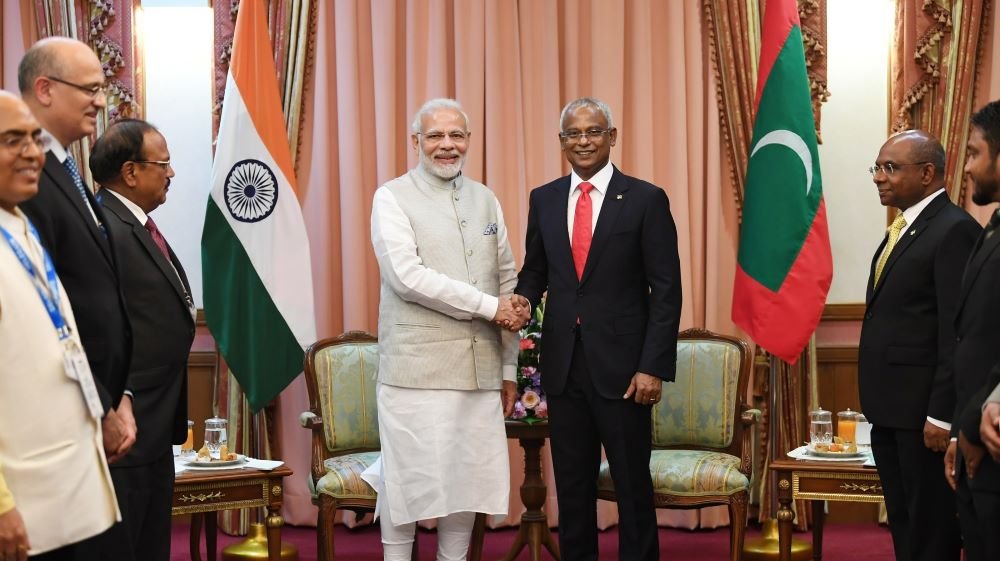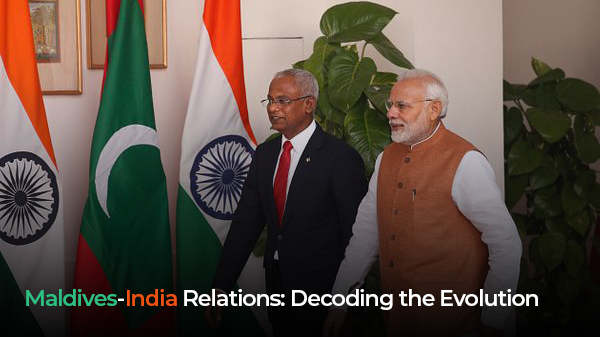The recent strain in India-Maldives relations has become a prominent topic, raising apprehensions about the future of their traditionally close partnership. Analyzing this shift requires delving beyond immediate developments and comprehending the intricate interplay of various factors:
Political Landscape:
President Muizzu’s Election:
One of his primary campaign pledges involved distancing the Maldives from India.
His electoral success mirrored growing domestic discomfort regarding perceived Indian influence.
While the “India Out” narrative was orchestrated, it resonated with concerns about sovereignty and economic control.
Domestic Politics in Maldives:
Muizzu aims to consolidate power by adopting a distinct approach from his predecessor.
The opposition may continue to exploit anti-India sentiment for political gains.
Geopolitical Shifts:

China’s Growing Assertiveness:
The Maldives, seeking economic benefits, has strengthened ties with China, causing unease in India.
India is wary of China’s infrastructure investments and the potential for debt traps.
India’s Regional Ambitions:
India’s aspiration to be a “net security provider” may be perceived as overbearing by the Maldives.
Previous Maldivian administrations’ increased defense cooperation with India might have fueled unease.
Additional Factors:
Misinformation and Perception Management:
Both sides face campaigns aiming to create negative perceptions of the other.
Addressing these narratives and building trust is crucial.
Economic Considerations:
The Maldives, heavily dependent on tourism, seeks diversification but is concerned about Indian control in key sectors.
Establishing mutually beneficial economic partnerships is essential.
Uncertain Future:
While the current trajectory is worrisome, a complete severing of ties seems improbable. Both nations share vital interests, including maritime security and economic relations.
Possible Paths Forward:
Open Communication and Dialogue:
Addressing concerns at various levels, including through official channels and civil society engagement.
Reassuring the Maldives about respect for its sovereignty and promoting mutually beneficial cooperation.
Focus on Shared Interests:
Emphasizing areas like counter-terrorism, disaster management, and sustainable development.
Building projects that prioritize Maldivian needs and address economic concerns.
Regional and Multilateral Engagement:
Including the Maldives in regional initiatives to foster a sense of co-ownership and shared responsibility.
Collaborating on issues of common concern through multilateral platforms.
The future of India-Maldives relations hinges on navigating these complex factors and finding pathways that respect each other’s interests and address concerns directly. Open communication, a focus on shared priorities, and regional engagement are crucial to restoring warmth and trust in this vital partnership.
Remember, this is a concise analysis. If you have specific aspects of the shift you’d like to explore further, feel free to ask for more details and insights!
Also Read: Rs 4,000 Crore Share Buyback: Bajaj Auto Board Greenlights at Rs 10,000/Share



1 thought on “Maldives-India Relations: Decoding the Evolution”